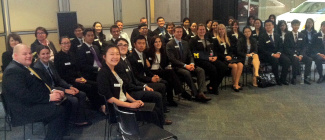The Truth About the Michigan Ross Culture

By Adam Zahn, MAcc ʼ15
When I moved to Ann Arbor in late August to start my Masters of Accounting at the Ross School of Business, I had some apprehensions.
Compared to my undergrad college, the University of Michigan is huge. And I had always thought of Ross as being extremely competitive. Considering I had been working for a very collaborative nonprofit children’s museum, I wasn’t sure a competitive culture would be right for me.
Now, three months later, I’m surprised to find how wrong I was about Ross. While BBA graduates from Ross form the backbone of the MAcc, there is also a wide diversity of students from other schools and programs. The support and welcoming nature of this student body have been a pleasant surprise. I may be attending a school with more than 40,000 students, but the MAcc Program has a sense of unity I would expect from a much smaller institution.
While the MAcc Program may feel small, it is hands down the most rigorous academic program I have ever experienced. The professors are knowledgeable, skilled, and have the kind of high expectations that require us to stretch as students.
Earlier this year I took a class called Leading Non-Profit Organizations. Each week a CEO or Executive Director of a nonprofit would be in our classroom seeking our advice on how to solve current problems they faced. I particularly liked our engagement with Tom Torkelson, CEO and Founder of IDEA Public Schools, a network of tuition free K-12 charter schools in Texas.
In the last decade, IDEA has had double digit growth in attendance every year and is struggling to keep up with demand while preserving the high standards they set for teachers and employees at all levels. Our discussion with Tom touched on everything from improving parent involvement, to increasing student engagement, to developing strategies on how to retain talent. This wasn’t some hypothetical case; this was face to face dialogue about current issues with a real leader — one who is committed to growing leaders all around him.
Talking with Tom reaffirmed my long-term career goal to someday return to the nonprofit world. Causes don’t solve themselves. It takes hard work, commitment, and skill to lead a mission-based organization. Those leaders need not only passion and dedication, but also the aptitude to make a difference. The skills I am developing at Ross right now are giving me the ability to do just that.







